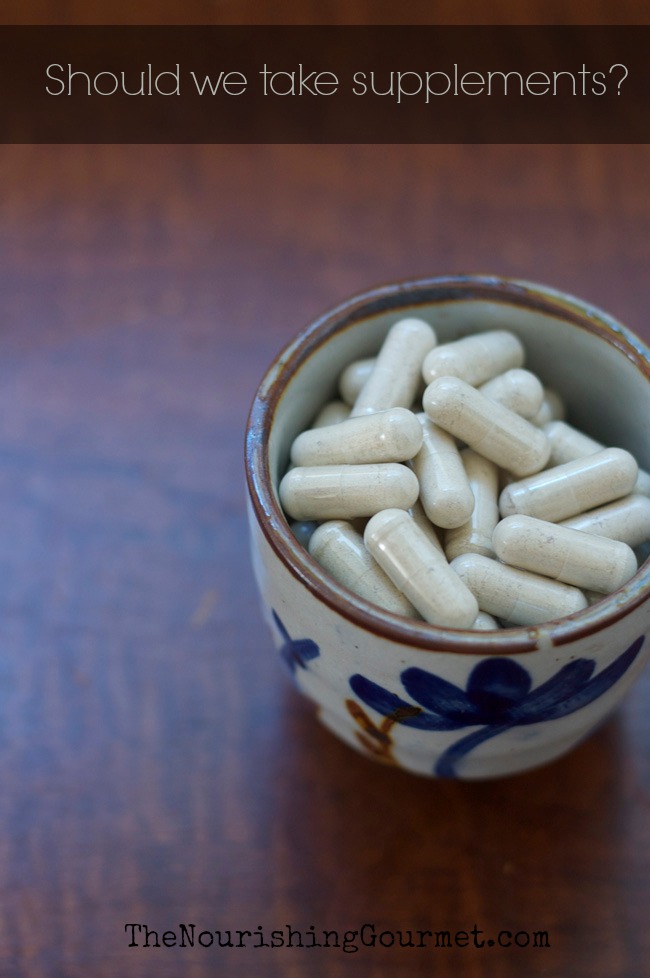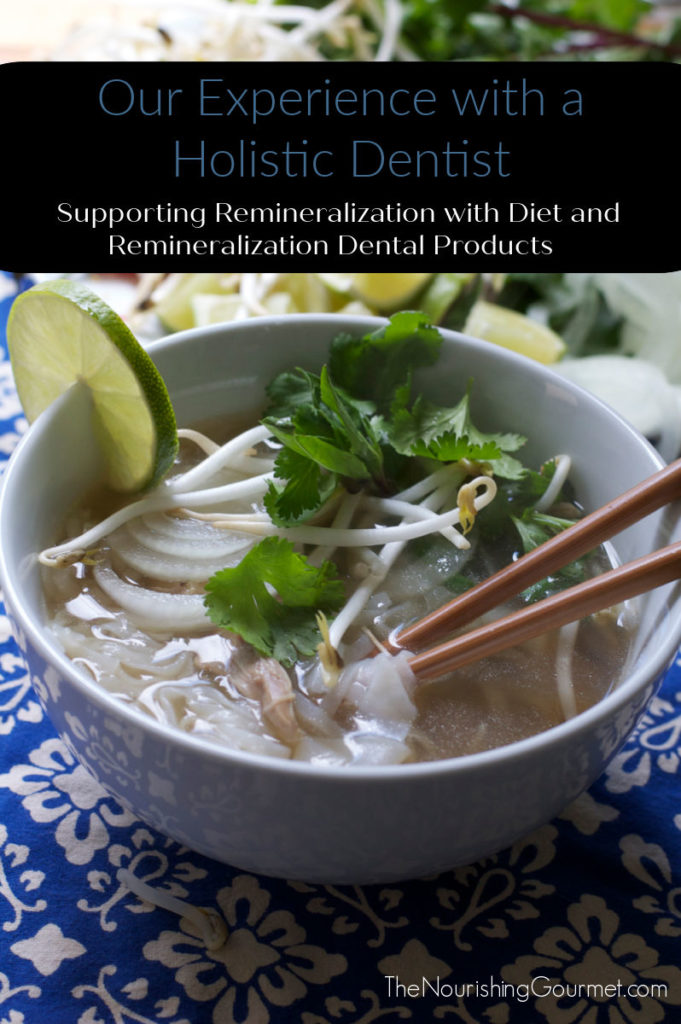
Whether you should take a multi-vitamin or one of the many supplements available is a controversial topic. It’s also a confusing one. I am asked on a very frequent basis what my thoughts are on this topic, especially by those trying hard to eat a nourishing diet, so I thought it was finally time to take the plunge and share some of the pros and cons to supplementation. My hope is that it gives you helpful information so that you can make a thoughtful decision for yourself. And stay tuned for some non-synthetic ways to super-boost your body’s nutrient intake too!
Disclaimer: I am offering you information today. I am not your doctor. Your health decisions are up to you, and getting advice from a trusted health care provider is always a good idea when sorting through these decisions. This post is not comprehensive, but tries to hit some of the main pros and cons. I’d love for you to add more information and opinions in the comment section. And finally, there are some affiliate links in this post. Thank you for supporting my blog!
Why taking supplements could be a good idea
Most people are deficient in one or more nutrients
While it’s always preferable to get nutrients from food, many don’t get enough because of inadequate diets, the lack of nutrients in the soil our food was grown from, or the inability to absorb vitamins efficiently. It may take years to get deficient through eating habits, and it could take years again to rebuild solely through food. Supplements can help supercharge that rebuilding process.
Supplementing can have great results when done correctly
I’ve taken some really high quality supplements given to me by my doctor that helped me overcome my tendency to catch every cold that went around last year. He’s also helped to diagnose and then rebuild certain deficiencies that I had (such as iron), through proper supplementation. I have to say that when working with a really knowledge doctor doing proper lab work, proper supplementation has been incredibly helpful for me. A previous naturopath I worked with helped me overcome a terrible UTI using strong herbs. I have a lot of respect for how helpful supplementation, in it’s various forms, can be. I know that clinically certain supplements are used to help with detoxing, treating certain illnesses and diseases, or to help compensate for genetic issues. Folic Acid supplementation has been shown helpful in reducing certain birth defects.
But there are concerns.
The concern with supplements
Some supplements are really low quality
If you decide that you would benefit from supplementation, realize that not all are equal. Mercola points out that selenium in it’s non-organic form is actually toxic instead of healthful, yet it can be found in some supplements. And is just one of many examples of the horrors that could be in your supplement capsule. When you buy a supplement, you are generally putting a blind trust in the company’s quality control, which is pretty sketch for some companies. There can be everything from poor vitamin balancing in multi-vitamins, to toxic ingredients, to added ingredients that are just not helpful long term for health.
There can be side effects to supplements
Mercola also mentions that while folate has been shown helpful for reducing birth defects, getting too much of it may actually increase your risk for certain types of cancers. I really admire and respect the work of Julia Ross, who uses amino acids as well as food to help people get to a healthy weight, recover from depression and addictions, and more. But, as she notes in her books, you do need to be aware of some of the side effects certain amino acids could have. Just because an amino acid works well for someone’s journey in recovering his or her health, does not mean that it would be appropriate for everyone. Just because a supplement can be helpful sometimes doesn’t mean that it is helpful at all times for all people. Herbs can be a wonderful way to boost the immune system, but you also need to understand any contradictions they have before using.
Supplementation could lead to imbalances of nutrients in the body
We kind of have this black and white thinking to nutrients and, really, food in general. Sweets = bad; Vitamin B = good. But it’s a lot more complex than that. For good health, we need to respect the complexities of what food has to offer us that an isolated nutrient can’t compare to. It’s become clearer and clearer that nutrients work in a well-balanced dance – a dance that can be disrupted when we consume isolated nutrients. This is true whether you are getting too much copper through a multi-vitamin, take calcium without regard to the many co-factors it needs to be used by the body, and for the many links and connections between nutrients still left unexplored and undiscovered.
Supplements can harm you
If that’s not enough, there are other studies that throw supplementation in a dark light. Calcium supplements have been linked to an increase of heart attacks. While low-calcium diets have been shown to be harmful in a variety of ways, taking supplements to combat that problem may not always be good idea. Going back to folic acid, supplementation by those at risk of colon cancer was shown to increase the risk of developing multiple or more serious polyps instead of helping prevent future problems. Herbal supplements have been shown to have illegally high pesticide amounts, and toxins like lead and mercury.
Chris shares some other negative results of supplementation, including that many trials showed no positive effect on chronic disease by supplementing the B vitamins, that beta-carotene had no evidence of helping smokers, but could harm them instead, and that high doses of vitamin E increased the risk of death. In fact, supplementation of beta-carotene, Vitamin A and E were all found to increase death rates.
So what are we to do?
The most important take-away from this discussion is not whether or not you should take supplements, but rather that eating a nutrient-dense, well balanced diet is by far your best bet for a nourished, healthy body. Nutrient deficiencies are real and have real consequences, but correcting our diet should always be our first step.
Also, taking “real food” supplements in proper doses can be an excellent way to add to the nutrient-density to your diet, such as in the forms of fermented cod liver oil, and liver pills. Instead of isolated nutrients, these are especially nutritious food items taken in “supplement” form.
One way to find pure supplements
When researching for this post, I came across information from both my personal M.D./N.D and other naturally minded doctors that good companies will have their products tested by independent labs to analyze it for purity (and potency) and that they will also be willing to share those reports with you. I am curious if companies will be as willing to share these lab results with someone who doesn’t have “M.D.” behind their name, but I am hoping it will help me in the future. If you have had success in having lab results sent to you by supplement companies, I’d love to hear from you!
Where I’m personally at:
I remain quite cautious towards much of supplementation, however I do use a variety of supplements (somewhat under protest, under doctor’s orders). For example, I am currently using a whole food supplement, where the nutrients are from food, instead of synthetic form. (I also give my kids this one
). As a disclaimer, while this brand is generally considered a good choice by many in the health community, I haven’t followed through with seeing if they would be wiling to share independent purity test results with me yet.
I also will sometimes use a multi-vitamin recommended by my doctor (another brand only available through a professional). Because I had such low iron, I have also been on Floradix (a more naturally sourced iron supplement that in my opinion is a much better iron supplement than most), and we are adding some vitamin A and D to my cod liver oil dose to help get my levels more optimal (but they won’t be permanent supplements). Because too high of some of these nutrients can be toxic, it has been important for me to be working with a doctor and getting myself tested during this period of rebuilding certain levels. (I share this not to say that everyone should do something similar, just to be open about where I am at personally. This is for my specific situation.)
As a side note, as many of you know, I buy certain supplements, such as my iron supplement and multi-vitamins, here. I am able to save about ten dollars a bottle on my iron that way! I also have been buying certain supplement from PureFormulas.com (I really like many of the high quality brands they carry, and I bought my liver pills and liver powder from them. I like that they don’t just carry any brand, but more carefully select the brands they carry. They also carry some of the brands recommended to me by my doctors, which has been helpful.)
Do you take any type of supplements? Why or why not? If so, what do you take.
